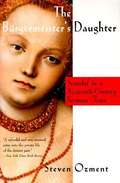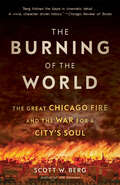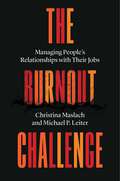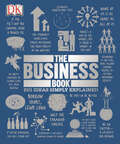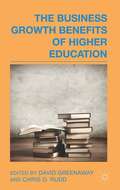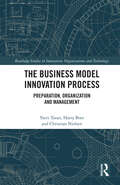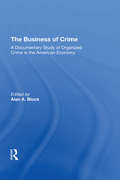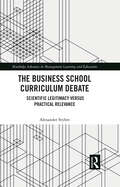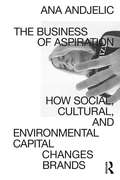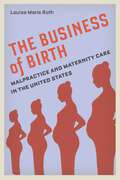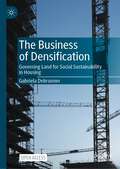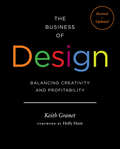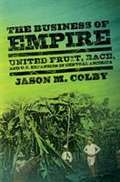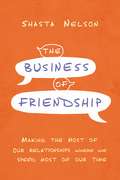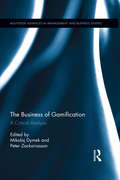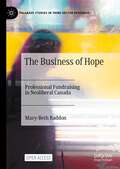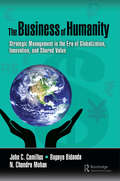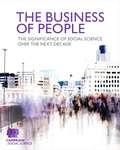- Table View
- List View
The Burgermeister's Daughter: Scandal In A Sixteenth-Century German Town
by Steven OzmentIn an era when women were supposed to be disciplined and obedient, Anna proved to be neither. Defying 16th-century social mores, she was the frequent subject of gossip because of her immodest dress and flirtatious behavior. When her wealthy father discovered that she was having secret, simultaneous affairs with a young nobleman and a cavalryman, he turned her out of the house in rage, but when she sued him for financial support, he had her captured, returned home and chained to a table as punishment. Anna eventually escaped and continued her suit against her father, her siblings and her home town in a bitter legal battle that was to last 30 years and end only upon her death. Drawn from her surviving love letters and court records, The Burgermeister's Daughter is a fascinating examination of the politics of sexuality, gender and family in the 16th century, and a powerful testament to the courage and tenacity of a woman who defied the inequalities of this distant age.
The Burn Farm
by Michael BensonBenson takes readers behind the scenes of the sadistic and horrific true story of Shelia LaBarre, a depraved woman who tkaes in troubled men as lovers, then savagely slaughters them and burns their bodies on her New Hampshire farm. photos. Original.
The Burning of the World: The Great Chicago Fire and the War for a City's Soul
by Scott W. BergWINNER OF THE MIDLAND AUTHORS AWARD FOR HISTORY • LONGLISTED FOR THE ANDREW CARNEGIE MEDAL FOR EXCELLENCE • A NEW YORKER BEST BOOK OF THE YEAR • The "illuminating" (New Yorker) story of the Great Chicago Fire: a raging inferno, a harrowing fight for survival, and the struggle for the soul of a city—told with the "the clarity—and tension—of a well-wrought military narrative" (Wall Street Journal)In the fall of 1871, Chicagoans knew they were due for the &“big one&”—a massive, uncontrollable fire that would decimate the city. It had been bone-dry for months, and a recent string of blazes had nearly outstripped the fire department&’s already scant resources. Then, on October 8, a minor fire broke out in the barn of Irishwoman Kate Leary. A series of unfortunate mishaps and misunderstandings along with insufficient preparation and a high south-westerly wind combined to set the stage for an unmitigated catastrophe. The conflagration that spread from the Learys' property quickly overtook the neighborhood, and before long the floating embers had been cast to the far reaches of the city. Nothing to the northeast was safe. Families took to the streets with every possession they could carry. Powerful gusts whipped the flames into a terrifying firestorm. The Chicago River boiled. Over the next forty-eight hours, Chicago fell victim to the largest and most destructive natural disaster the United States had yet endured. The effects of the Great Fire were devastating. But they were also transforming. Out of the ashes, faster than seemed possible, rose new homes, tenements, hotels, and civic buildings, as well as a new political order. The elite seized the reconstruction to crack down on vice, control the disbursement of vast charitable funds, and rebuild the city in their image. But the city&’s working class recognized only a naked power grab that would challenge their traditions, hurt their chances to keep their hard-earned property, and move power out of the hands of elected officials and into private interests. As soon as the battle against the fire ended, another battle for the future of the city erupted between its entrenched business establishment and its poor and immigrant laborers and shopkeepers. An enrapturing account of the fire&’s inexorable march and an eye-opening look at its aftermath, The Burning of the World tells the story of one of the most infamous calamities in history and the new Chicago it precipitated—a disaster that still shapes American cities to this day.
The Burnout Challenge: Managing People’s Relationships with Their Jobs
by Michael P. Leiter Christina MaslachTwo pioneering researchers identify key causes of workplace burnout and reveal what managers can do to promote increased productivity and health.Burnout is among the most significant on-the-job hazards facing workers today. It is also among the most misunderstood. In particular, we tend to characterize burnout as a personal issue—a problem employees should fix themselves by getting therapy, practicing relaxation techniques, or changing jobs. Christina Maslach and Michael P. Leiter show why this is not the case. Burnout also needs to be managed by the workplace.Citing a wealth of research data and drawing on illustrative anecdotes, The Burnout Challenge shows how organizations can change to promote sustainable productivity. Maslach and Leiter provide useful tools for identifying the signs of employee burnout, most often exhaustion, cynicism, and ineffectiveness. They also advise managers on assembling and interpreting worker self-evaluation surveys, which can reveal workplace problems and potential solutions. And when it comes to implementing change, Maslach and Leiter offer practical, evidence-driven guidance. The key, they argue, is to begin with less-taxing changes that employees nonetheless find meaningful, seeding the ground for more thorough reforms in the future.Experts estimate that more than $500 billion and 550 million workhours are lost annually to on-the-job stress, much of it caused by dysfunctional work environments. As priorities and policies shift across workplaces, The Burnout Challenge provides pragmatic, creative, and cost-effective solutions to improve employee efficiency, health, and happiness.
The Business Book (DK Big Ideas)
by DKLearn about concepts, management, and commerce in The Business Book.Part of the fascinating Big Ideas series, this book tackles tricky topics and themes in a simple and easy to follow format. Learn about Business in this overview guide to the subject, great for beginners looking to learn and experts wishing to refresh their knowledge alike! The Business Book brings a fresh and vibrant take on the topic through eye-catching graphics and diagrams to immerse yourself in. This captivating book will broaden your understanding of Business, with:- Up to 100 quotations from the great business thinkers and gurus- Packed with facts, charts, timelines and graphs to help explain core concepts- A visual approach to big subjects with striking illustrations and graphics throughout- Easy to follow text makes topics accessible for people at any level of understandingThe Business Book is the perfect introduction the to key theories that have shaped the world of business, management, and commerce, aimed at adults with an interest in the subject and students wanting to gain more of an overview. Here you&’ll discover every facet of business management, including alternative business models, with real life examples from the marketplace. If you&’ve ever wondered about the stages of business strategy, from start-up to delivering the goods, this is the perfect book for you.Your Business Questions, Simply ExplainedThis book introduces the would-be entrepreneur and general reader to the work of great commercial thinkers, leaders, and gurus. Learn about the hurdles facing every new business, such as finding a gap in the market, securing finance, employing people, and creating an eye-catching brand. If you thought it was difficult to learn about the world of commerce, The Business Book presents information in an easy to follow layout. Learn the ideas of seminal business thinkers, such as Malcolm Gladwell's "tipping point", Michael Porter's "five forces", and Meredith Belbin's theories on effective teamwork, with fantastic mind maps and step-by-step summaries. The Big Ideas SeriesWith millions of copies sold worldwide, The Business Book is part of the award-winning Big Ideas series from DK. The series uses striking graphics along with engaging writing, making big topics easy to understand.
The Business Case for Love: How Companies Get Bragged About Today
by Marc CoxLove it? Hate it? Or, just don’t care? How we feel about something dramatically affects how we interact with it. When we feel, we care. When we care, things happen. Companies that are thriving, not just surviving, are much more than a set of ruthlessly efficient and mechanistic processes – they are a social system operated by people for people. The quality of relationships, both inside and outside the organization is a far more important driver of sustainable success or failure than the quality of its control systems. The head is important, but it is the heart that matters most. If you want your customers to be brand ambassadors and your employees to brag about you to their friends, you need them to not just think you’re great – you need them to feel you’re great. You need them to love you – and for that, you need them to feel that you love them. For over a decade Marc Cox has been helping companies whose toxic cultures, miserable employees, and angry customers have all but destroyed them to rebuild their company spirit, discover the business case for love and build an organization that is wonderful to work for, brilliant to do business with and has the mindset of creating memorable employee and customer experiences. Underpinned by fresh insights and perspectives, robustly tested and refined by the real world experience of working with a wide range of companies and over 2,000 senior executives drawn from all parts of the world, and filled with fascinating and illustrative “love stories” the book will help you to make the business case for love. It will help you to find a more rewarding and invigorating way of working – both emotionally and financially. In short, it shows what happens when the love is put back into business.
The Business Growth Benefits of Higher Education
by David Greenaway Chris D. RuddThis book tackles the role of universities in driving economic growth. Their role as providers of talent, technology and new ideas is considered in the light of the 2008 Global Financial Crisis. A series of expert authors consider success, opportunity and how national frameworks can be fine-tuned to deliver business success.
The Business Model Innovation Process: Preparation, Organization and Management (Routledge Studies in Innovation, Organizations and Technology)
by Christian Nielsen Harry Boer Yariv TaranBusiness Model Innovation Process: Preparation, Organization and Management examines a range of critical questions that merit thoughtful interdisciplinary consideration, such as: Why do business models, and their innovation in particular, matter today? How can the process of business model innovation be understood, organized and managed adequately under increasingly volatile, uncertain, complex and ambiguous technological, business and geo-political conditions? What should decision-making and risk-management look like under these conditions, with managers whose rationality is bounded? The book offers a detailed account of the relatively unknown process of business model innovation by looking into the intersection of strategic, operations and innovation management, organizational design, decision-making and performance management. In doing so, this book addresses fundamental issues, and introduces new ideas and theoretical perspectives. In envisioning and thinking about various potential scenarios of business model innovation and understanding how to organize for each of these under different conditions, the book provides original arguments and suggestions for practitioners. For that purpose, the book also offers many compelling real-life examples of business models and their innovation. Combining theory and practice, this book is an essential read for researchers and academics of business model innovation, as well as strategic management, digital transformation, innovation management and organizational change. It will also be of direct interest to practitioners and business leaders seeking new perspectives to increase their competitive advantage.
The Business Of Crime: A Documentary Study Of Organized Crime In The American Economy
by Alan A BlockMembers of organized crime syndicates have gained control of key businesses and trade unions through their strategic positions as arbiters of labor-management conflicts and as dispensers of illegal credit. They are managing important sectors of the contemporary marketplace, engaging in activities far more significant than the vice enterprises usually associated with criminal activity. Difficult to access for scholarly study, organized crime is best documented in judicial findings and in legislative reports from criminal investigations and public hearings. In this book, Alan Block has assembled a rich cross section of these reports. Taken together, they illustrate how organized crime has infiltrated important industries and taken control of union pension and welfare funds. Designed for students of criminology, sociology, and deviance, the book provides a comprehensive overview of the business of crime in America today.
The Business School Curriculum Debate: Scientific Legitimacy versus Practical Relevance (Routledge Advances in Management Learning and Education)
by Alexander StyhreWith more than 14,000 business schools worldwide, what is included in their curricula matters for how the economy and the corporate system are managed. Business schools should be subject to scholarly inquiries and critical reflection. While many studies of business schools examine its general role in the tertiary education system and in society more broadly, this volume examines how one specific theoretical perspective and a normative model derived therefrom were developed and gradually appropriated within the business school setting. This volume demonstrates that agency theory, based on a daring conjecture that firms can be construed as bundles of contacts, rose to prominence in the business school context. It examines how the elementary proposition of agency theory, that the firm is to be considered theoretically and practically as a "nexus of contracts," was never consistent with corporate law and contract law, and it was empirically unsubstantiated. Business schools are under pressure to teach not only practically useful theories and models, but also theories that are also scientifically qualified. Despite having this ambition, certain theories are widely taught despite failing to live up to such declared ambitions, which means that business schools may be criticized for including theories on ambiguous grounds in the curricula. This book examines how business schools seek to honour the ambition to teach both scientifically verified theories and practically useful concepts and models, and how the tensions derived from this duality may be problematic to handle. It will be of interest to researchers, academics, and advanced students in the fields of management education, organizational studies, and legal theory.
The Business Shrink - The Disgruntled Employee
by Peter Morris Peter LauferDo your employees plan exit strategies around the water cooler?Are your office hallways filled with nasty gossip?Is your productivity shrinking and your profits dissolving?As a manager, every day you're faced with disgruntled employees. Now Peter Morris, host of the popular radio show "The Business Shrink," draws on his long experience to help you fix these problems.Gleaning tips from experts such as CNN commentator Lou Dobbs and job search guru Martin Yate, Morris shows you how to:Give workers strong, positive feedbackBreak the endless chain of blaming and backstabbingAbolish poor employee performance and boost productivityNip cases of harassment and bullying in the budUsing sample scenarios, workplace quizzes, and actual examples from Morris's show, you'll learn how to create a harmonious workplace and how to turn disgruntled workers into productive, committed employees.
The Business Shrink - The Disgruntled Employee
by Peter Morris Peter LauferDo your employees plan exit strategies around the water cooler?Are your office hallways filled with nasty gossip?Is your productivity shrinking and your profits dissolving?As a manager, every day you're faced with disgruntled employees. Now Peter Morris, host of the popular radio show "The Business Shrink," draws on his long experience to help you fix these problems.Gleaning tips from experts such as CNN commentator Lou Dobbs and job search guru Martin Yate, Morris shows you how to:Give workers strong, positive feedbackBreak the endless chain of blaming and backstabbingAbolish poor employee performance and boost productivityNip cases of harassment and bullying in the budUsing sample scenarios, workplace quizzes, and actual examples from Morris's show, you'll learn how to create a harmonious workplace and how to turn disgruntled workers into productive, committed employees.
The Business Shrink - The Disgruntled Employee: Manage Challenging Staff Without Losing Your Mind
by Peter MorrisDo your employees plan exit strategies around the water cooler?Are your office hallways filled with nasty gossip?Is your productivity shrinking and your profits dissolving?As a manager, every day you're faced with disgruntled employees. Now Peter Morris, host of the popular radio show "The Business Shrink," draws on his long experience to help you fix these problems.Gleaning tips from experts such as CNN commentator Lou Dobbs and job search guru Martin Yate, Morris shows you how to:Give workers strong, positive feedbackBreak the endless chain of blaming and backstabbingAbolish poor employee performance and boost productivityNip cases of harassment and bullying in the budUsing sample scenarios, workplace quizzes, and actual examples from Morris's show, you'll learn how to create a harmonious workplace and how to turn disgruntled workers into productive, committed employees.
The Business and Human Rights Landscape
by Jena MartinThe adoption of the United Nations Guiding Principles on Business and Human Rights in 2011 marked a watershed moment, establishing the first global standards for preventing human rights abuses by business. In light of this paradigm shift, The Business and Human Rights Landscape offers the most comprehensive analysis to date of the current legal framework. It includes in-depth explorations of the UN Guiding Principles from both theoretical and practical standpoints, with case studies ranging from the Rana Plaza building collapse to Kenyan resource extraction. Bookending current analyses are historical accounts (discussing the colonial slave trade) and forward-looking perspectives (analyzing labor's role). Bringing together top scholars from across the globe, The Business and Human Rights Landscape represents essential reading for anyone interested in the past, present, or future of business and human rights.
The Business of Aspiration: How Social, Cultural, and Environmental Capital Changes Brands
by Ana AndjelicNot long ago, wearing real fur was a signal of wealth and status. Now, it’s a signal of ignorance. Thanks to luxury rental and resale services, these days anyone can walk around in a Gucci belt. But not everyone knows that Rimowa dropped a new suitcase or who made their food and clothes. Wokeness is a modern class distinction. For the longest time, brands have operated according to the Veblen logic that status is linked to wealth and desirability to price. Now they have the opportunity to flip the script of aspiration and link worth and values to their success. Aimed at marketers, entrepreneurs, and advertising professionals, this book is full of analysis, examples, and tools of how to use the modern aspiration economy to shift a brand narrative and competitive strategy, create and distribute brand symbols, and ensure that a brand’s products and services create both monetary and moral value.
The Business of Birth: Malpractice and Maternity Care in the United States
by Louise Marie RothHow the fear of malpractice affects mothers and reproductive choicesGiving birth is a monumental event, not only in the personal life of the woman giving birth, but as a medical process and procedure. In The Business of Birth, Louise Marie Roth explores the process of giving birth, and the ways in which medicine and law interact to shape maternity care.Focusing on the United States, Roth explores how the law creates an environment where medical providers, malpractice attorneys, and others limit women’s rights and choices during birth. She shows how a fear of liability risk often drives the decision-making process of medical providers, who prioritize hospital efficiency over patient safety, to the detriment of mothers themselves.Ultimately, Roth advocates for an approach that protects the reproductive rights of mothers. A comprehensive overview, The Business of Birth provides valuable insight into the impact of the law on mothers, medical providers, maternity care practices, and others in the United States.
The Business of Corporate Learning
by Shlomo Ben-HurCorporate learning functions are now an established part of many of the world's leading multinational firms. In this book, Shlomo Ben-Hur demonstrates how corporate learning can and should have an integral, strategic, role in a company. Based on firsthand experience, Ben-Hur provides a practical guide to setting up or restructuring a corporate learning function within a company, covering its seven key activities. He identifies and elucidates the key decision points in this process. But The Business of Corporate Learning is much more than a 'how-to' guide. For the first time, this book sheds light on the reasons for success or failure in the strategic deployment of corporate learning. Real-world case studies are used to illustrate the potential pitfalls and demonstrate how - when successfully integrated into the company's strategic management system - corporate learning is able to deliver tangible business results.
The Business of Densification: Governing Land for Social Sustainability in Housing
by Gabriela DebrunnerAffordable housing shortage and social exclusion have become severe societal problems across the globe. Increasing numbers of people are suffering from social eviction and displacement due to urban densification, modernization, rising rents, and intense housing commodification. Vulnerable resident groups – such as old-aged or households with children – who often live in old housing stocks planned to be densified, renovated, or upgraded with higher rents, are forced to leave the urban core centers because they can no longer afford to live in central locations, or because they experience unstable or insecure housing conditions. A scenario that is highly unsustainable.So far, studies on densification have mainly considered the process as technological, architectural, or design-based problem (e.g., Kyttä et al., 2013; Broitman & Koomen, 2015; Bibby et al., 2018). However, systematic knowledge on how to implement densification objectives sustainably – regarding economic, environmental, and social aspects – is still lacking. This book tackles this gap by analyzing densification from a governance perspective. Its point of departure is that densification per se does not necessarily lead to sustainable outcomes in terms of social inclusion, cohesion, or community stability. Rather, it politicizes densification by neglecting how the process is planned, implemented, and governed by the actors involved.The book applies an actors-centered neoinstitutionalist political ecology approach to reveal the specific objectives and strategies of actors involved, as well as the socio-political structures (i.e. rules. laws, and policies) that govern densification. Four Swiss in-depth empirical qualitative case studies (Zürich, Basel, Köniz, and Kloten) illustrate the political and legal conditions for success or failure for (un)sustainable implementations of densification. Ultimately, this book advises stakeholders, governments, urban practitioners, and academics on more effective, community-oriented, collective, and decommodified forms of governance to respond to the needs of the public at large rather than simply catering to private individuals and firms. Such governance initiatives entail active municipal land policy approaches outside a purely market-based investment logic that not only limit, but also work with property rights.This is an open access book.
The Business of Design: Balancing Creativity and Profitability
by Keith GranetThe Business of Design debunks the myth that business sense and creative talent are mutually exclusive, showing design professionals that they can pursue their passion and turn a profit. For nearly thirty years, consultant Keith Granet has helped designers create successful businesses, from branding to billing and everything in between. Unlike other business books, The Business of Design is written and illustrated to speak to a visually thinking audience. The book covers all aspects of running a successful design business, including human resources, client management, product development, marketing, and licensing. This timely update on the tenth anniversary of the first edition includes new content on social media, working from home, and understanding and working with different generations, essential tools in today's ultracompetitive marketplace.
The Business of Empire: United Fruit, Race, and U. S. Expansion in Central America
by Jason M. ColbyThe link between private corporations and U.S. world power has a much longer history than most people realize. Transnational firms such as the United Fruit Company represent an earlier stage of the economic and cultural globalization now taking place throughout the world. Drawing on a wide range of archival sources in the United States, Great Britain, Costa Rica, and Guatemala, Colby combines "top-down" and "bottom-up" approaches to provide new insight into the role of transnational capital, labor migration, and racial nationalism in shaping U.S. expansion into Central America and the greater Caribbean. The Business of Empire places corporate power and local context at the heart of U.S. imperial history. In the early twentieth century, U.S. influence in Central America came primarily in the form of private enterprise, above all United Fruit. Founded amid the U.S. leap into overseas empire, the company initially depended upon British West Indian laborers. When its black workforce resisted white American authority, the firm adopted a strategy of labor division by recruiting Hispanic migrants. This labor system drew the company into increased conflict with its host nations, as Central American nationalists denounced not only U.S. military interventions in the region but also American employment of black immigrants. By the 1930s, just as Washington renounced military intervention in Latin America, United Fruit pursued its own Good Neighbor Policy, which brought a reduction in its corporate colonial power and a ban on the hiring of black immigrants. The end of the company's system of labor division in turn pointed the way to the transformation of United Fruit as well as the broader U.S. empire.
The Business of Friendship: Making the Most of Our Relationships Where We Spend Most of Our Time
by Shasta NelsonWant to be happier, healthier, and enjoy your job more?Make better friends at work.The data is in. It is virtually impossible to feel connected and supported in life when we don&’t feel that way where we spend most of our time—at work. Whether we work remotely or in an office, who we interact with consistently impacts everything from our longevity and mental health to our career success and job satisfaction.Unfortunately, too many of us don&’t feel like we belong at work in the ways we need. In addition to the 20% of us who report feeling lonely at work almost all the time, 60% of us report feeling it at least half the time., and that disconnection is taking a toll: more stress and burnout, less energy, decreased loyalty to our company, and increased dread for &“Monday morning.&”In The Business of Friendship, Shasta Nelson, a friendship expert, unpacks the distinct ways we can make work relationships the healthiest they can be, both for the sake of the employee and the mission of the company. She inspires readers to see why friendship is crucial to our health and our careers and teaches us exactly how to develop the supportive and meaningful connections we need.Our organizations benefit as well when our leaders encourage friendships at work. The outcome is higher levels of workplace productivity, employee retention, safety, innovation, collaboration, and profitability. In fact, having a best friend at work we are seven times more engaged in our job, which translates to better customer service, less absenteeism, fewer workplace accidents, and more loyalty to our organizations. The best employees are the ones who feel connected.Work is to adults as school is to kids—a consistent place with familiar people. But too few of us are taking advantage of this environment. This leaves us no other choice but to try to get all our relational needs met in our off-work hours, where most of us already report feeling &“too busy.&” The result? We stay lonely, wishing for more meaningful connections.Through Shasta&’s stories, research, and practical guidance, sheBreaks down what creates healthy bonds and reveals the 3 requirements necessary in all healthy relationships and teamsHelps managers and employees assess the health of their relationships and learn ways to repair and improve themProvides advice for addressing some of the biggest fears around workplace friendships, such as increased drama, favoritism, confidentiality, gossip, toxic coworkers, relationship with bosses, and potential romantic attractionsThe Business of Friendship is for those who are ready to maximize the two most significant factors of our wellbeing—career and relationships. Whether you are a leader or an employee, when you feel more connected and supported at work, everyone wins.
The Business of Gamification: A Critical Analysis (Routledge Advances in Management and Business Studies)
by Peter Zackariasson Mikolaj DymekAt the turn of the century the term "gamification" was introduced as a concept to understand the process of using game mechanics in "non-game" contexts. The impact of gamification was soon evident to business practices where it had impact both on marketing and, more broadly, on the organizations themselves. As the number of individuals playing video games grows, there seem to be an acceptance of game mechanics elsewhere. Its effectiveness is highly dependent on both technical possibilities and cultural acceptance, two factors present today. The aim of The Business of Gamification is to critically analyze the practical and theoretical consequences of gamification. Practically, how has gamification been applied in businesses to this point, and what are the future scenarios? Theoretically, what are the contributions of gamification to existing academic knowledge? How does this change our understanding of how business are performing and its consequences, for organizations, consumers, and society in general? This edited volume contains new, and stringent, perspectives on how gamification is contextualized in business settings, both in theory as well as in practice. This book will provide a wealth of research for individuals seriously interested in the industry at the academic level. As a result, this book will serve as a reference in curricula associated with video game development for years to come.
The Business of Hope: Professional Fundraising in Neoliberal Canada (Palgrave Studies in Third Sector Research)
by Mary-Beth RaddonThis open access book contributes to research on the ascendance of neoliberalism in Canada through the vantage point of professional fundraising in the 1990s and 2000s. Fifty high-ranking fundraisers from across Canada were interviewed through 2008 and 2009 about changes they had witnessed since starting their careers. Fundraising as an occupation was burgeoning in this period in response to the devolution of state responsibility across the major domains of nonprofit activity: education, health care, social services, the arts, recreation, overseas humanitarian activities, and environmental protection. Welfare state retrenchment left the nonprofit and voluntary sector competing for private sources of funding with the help of these newly hired expert staff. As fundraisers worked to instill a culture of philanthropy, while targeting the ultra-rich and advocating for tax-favourable treatment of major gifts, they became both products and promoters of the neoliberal political and cultural reconstruction of Canadian society.This is an open access book.
The Business of Humanity: Strategic Management in the Era of Globalization, Innovation, and Shared Value
by John Camillus Bopaya Bidanda N. Chandra MohanCompanies across the world, for a variety of reasons, are committing to incorporating social responsibility into their business models and finding that their profits are growing and their long-term sustainability is enhanced—building "humanity" into their business models as the driver of economic, environmental, and social sustainability. This fascinating development is a widely observable global phenomenon. The "Business of Humanity®" (BoH) Proposition is the synthesis of counter-intuitive but simple and powerful ideas about how companies can add value in today’s globalized and fast-changing world. The task of BoH Strategies is to overcome three critical challenges characterizing today’s business environment, namely disruptive technologies, conflicted stakeholders, and unknowable futures. BoH Strategies are designed to convert these challenges into opportunities for enhanced sustainability on all three dimensions—economic, environmental and social. Written by leading experts with decades of experience, this book: Provides a hands-on understanding of how to implement this powerful and rewarding approach to simultaneously add economic value and enhance social benefit Includes the experiences and approaches of highly regarded business executives and successful organizations Responds to the critical challenges created by three environmental mega forces – the inevitability of globalization, the imperative of innovation, and the importance of shared value. This book is based on lessons drawn from the real world and provides a compelling rationale for the power of the BoH Proposition. The pragmatic framework and process offered enable companies to develop and confidently implement value-adding strategies based on the BoH Proposition.
The Business of People: The significance of social science over the next decade
by Campaign for Social ScienceTackling infectious disease, understanding radicalisation, improving productivity, siting new airport capacity, getting people to save for retirement - nearly all the issues facing the UK now and in the near future demand the urgent attention of those trained to study human processes. In short, we need sharp social science now more than ever. The Business of People looks at the backdrop to the UK elections taking place in May 2015 to argue that we need to invest in science and innovation - not just for the sake of 'UK plc' and prospects for growth and economic recovery, but to inform debate and policymaking on migration, housing, devolution of power within the UK, and the UK's position in Europe. The report sets out the need for new economic and social knowledge and illustrates the many ways in which social scientists are contributing to changing practice and deepening knowledge. It outlines the size and structure of UK social science, its contribution to GDP, how social science graduates are essential to the work of firms, government and the third sector. The report ends with a set of recommendations for the next few years - urgent reading for the next government - on research funding, social science capacity and the use of expert advice by government. An open access electronic version of the report is downloadable from http://campaignforsocialscience. org. uk/businessofpeople/
